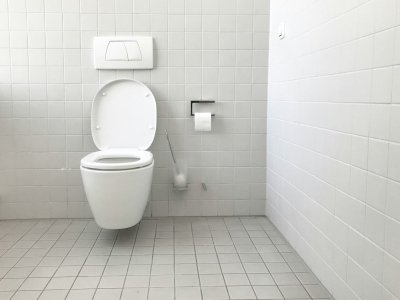Experts warn: The hidden risks of holding your pee—what you should know
By
Aubrey Razon
- Replies 0
Disclaimer: The information provided in this article is for educational purposes only and is not intended as a substitute for professional medical advice, diagnosis, or treatment. Always consult your physician or other qualified healthcare providers with any questions you may have regarding a medical condition or before making any changes to your health regimen.
As we age, even small habits can have a big impact on our health. One common habit—holding in your urine—might seem harmless, but experts are raising concerns.
The human body is a marvel of biological engineering, and the process of urination is no exception.
Our kidneys tirelessly filter waste from our blood, producing urine that travels down to the bladder.
When the bladder reaches about half of its capacity, which is typically 400 to 600 cubic centimeters, it sends a signal to the brain indicating it's time to find a restroom.
However, life's demands often lead us to override these signals.

Dr. Jason Kim, a urologist and expert in pelvic health, explains that our neurological system is designed to allow us to hold urine until we find a suitable moment to relieve ourselves.
This evolutionary trait kept our ancestors from leaving traces that could attract predators.
But in today's world, the predators we face are of a different kind: urinary tract infections (UTIs), kidney issues, and weakened bladder muscles.
The occasional delay in answering nature's call is unlikely to cause harm.
But when holding your pee becomes a regular practice, the risks escalate.
Bacteria that should be flushed out can multiply, leading to UTIs.
These infections can ascend to the kidneys, potentially causing pyelonephritis, a serious kidney infection, or even urosepsis, a life-threatening response to infection.
Moreover, habitually retaining urine can overstretch and weaken the bladder muscles, making it difficult to empty the bladder completely.
This can create a vicious cycle where leftover urine increases the risk for further infections.
For those in the over-60s community, the stakes are even higher.
Aging can bring changes such as enlarged prostates in men and tightening urethras in women, which can already make urination more challenging.
Add to that the reduced ability to fight infections, and the importance of heeding the urge to urinate becomes clear.
Certain groups need to be particularly vigilant.
Individuals with neurogenic bladder or kidney disorders, pregnant women, and those with weakened immune systems should prioritize timely bathroom breaks.
Additionally, if you're exposed to toxins like cigarette smoke or gasoline, frequent urination is crucial to reduce the risk of bladder cancer.
If you find yourself needing to urinate more often than usual, it could be a sign of an overactive bladder, diabetes, or a UTI.
In such cases, consulting with a urologist is essential to address the underlying issue and potentially engage in bladder training exercises.
For many, especially during these times of heightened health awareness, public restrooms can be a source of discomfort.
Dr. Jamin Brahmbhatt, a urologist and health communicator, empathizes with these concerns but stresses the importance of not holding in urine.
He suggests carrying disinfecting wipes or a portable seat cover to make the experience more comfortable.
So next time you feel the need to go, remember that your health is worth the interruption.
And if you're experiencing any changes in your urinary habits, don't hesitate to seek medical advice. Your bladder, kidneys, and overall well-being will thank you for it.
 Have you noticed changes in your bladder habits as you’ve gotten older? How often do you prioritize staying hydrated throughout the day? Share your experiences with us in the comments below.
Have you noticed changes in your bladder habits as you’ve gotten older? How often do you prioritize staying hydrated throughout the day? Share your experiences with us in the comments below.
As we age, even small habits can have a big impact on our health. One common habit—holding in your urine—might seem harmless, but experts are raising concerns.
The human body is a marvel of biological engineering, and the process of urination is no exception.
Our kidneys tirelessly filter waste from our blood, producing urine that travels down to the bladder.
When the bladder reaches about half of its capacity, which is typically 400 to 600 cubic centimeters, it sends a signal to the brain indicating it's time to find a restroom.
However, life's demands often lead us to override these signals.

Ignoring the body's signals to urinate can pose health risks, particularly if it becomes a regular behavior. Image source: Jan Antonin Kolar/Unsplash.
Dr. Jason Kim, a urologist and expert in pelvic health, explains that our neurological system is designed to allow us to hold urine until we find a suitable moment to relieve ourselves.
This evolutionary trait kept our ancestors from leaving traces that could attract predators.
But in today's world, the predators we face are of a different kind: urinary tract infections (UTIs), kidney issues, and weakened bladder muscles.
The occasional delay in answering nature's call is unlikely to cause harm.
But when holding your pee becomes a regular practice, the risks escalate.
Bacteria that should be flushed out can multiply, leading to UTIs.
These infections can ascend to the kidneys, potentially causing pyelonephritis, a serious kidney infection, or even urosepsis, a life-threatening response to infection.
Moreover, habitually retaining urine can overstretch and weaken the bladder muscles, making it difficult to empty the bladder completely.
This can create a vicious cycle where leftover urine increases the risk for further infections.
For those in the over-60s community, the stakes are even higher.
Aging can bring changes such as enlarged prostates in men and tightening urethras in women, which can already make urination more challenging.
Add to that the reduced ability to fight infections, and the importance of heeding the urge to urinate becomes clear.
Certain groups need to be particularly vigilant.
Individuals with neurogenic bladder or kidney disorders, pregnant women, and those with weakened immune systems should prioritize timely bathroom breaks.
Additionally, if you're exposed to toxins like cigarette smoke or gasoline, frequent urination is crucial to reduce the risk of bladder cancer.
If you find yourself needing to urinate more often than usual, it could be a sign of an overactive bladder, diabetes, or a UTI.
In such cases, consulting with a urologist is essential to address the underlying issue and potentially engage in bladder training exercises.
For many, especially during these times of heightened health awareness, public restrooms can be a source of discomfort.
Dr. Jamin Brahmbhatt, a urologist and health communicator, empathizes with these concerns but stresses the importance of not holding in urine.
He suggests carrying disinfecting wipes or a portable seat cover to make the experience more comfortable.
So next time you feel the need to go, remember that your health is worth the interruption.
And if you're experiencing any changes in your urinary habits, don't hesitate to seek medical advice. Your bladder, kidneys, and overall well-being will thank you for it.
Key Takeaways
- Ignoring the body's signals to urinate can pose health risks, particularly if it becomes a regular behavior.
- Holding in urine can increase the risk of urinary tract infections (UTIs), weaken bladder muscles, and even lead to kidney damage or infections.
- Experts advise against holding pee for too long, especially for people who may not be able to fight infections effectively, are older, pregnant, or have bladder or kidney disorders.
- It's important to heed one's urge to urinate, and people experiencing frequent urges to pee should consult a urologist to check for underlying conditions.






